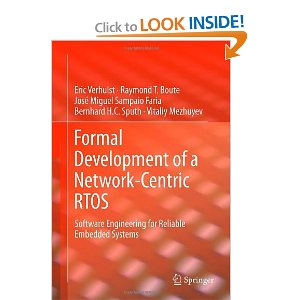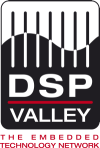You are hereOpenComRTOS Designer
OpenComRTOS Designer
Altreonic joins Artemis CRAFTERS project
Altreonic is partner in a new Artemis EU project, whose Kick-Off meeting was held in Kopenhagen on 13 to 15 June 2012. Called CRAFTERS (ConstRaint and Application driven Framework for Tailoring Embedded Real-time Systems) it brings together 26 partners covering from EDA vendors, semiconductor designers and manufacturers, software tool vendors, industrial users as well as academia.
Altreonic's product range and roadmap is fully in line addressing the CRAFTERS challenges and will focus on extending OpenComRTOS Designer with dynamic resource scheduling capabilities. Given the abundancy of hardware resources on modern multicore chips, research is focusing on dynamic resource scheduling, whereby a resource is not just CPU time but can also be any of the hardware capabilities. This is using an extended version of the distributed priority inheritance algorithm in OpenComRTOS. The work includes interfacing with other third party tools and defining requirements for the hardware.
New white paper on real-time challenges programming of advanced multicore chips
Multicore chips are becoming more and more the norm these days. This is an evolution driven by the semiconductor advances that allow to put more and more logic on the same die. In addition, as all is on a single die, communication between cores can be speedy and low power as no off-chip I/O is necessary. Nevertheless programming these chips, especially for embedded real-time applications is a challenge.
Following the availability of OpenComRTOS on the 48-core Intel SCC chip and the 8-core Texas Instruments C6678, Altreonic can draw some lessons. OpenComRTOS was designed to support such targets transparently and in a distributed real-time context by separating the hardware topology definition from the application topology definition. This provides for portability and scalability. Nevertheless, these modern multicore chips are complex and it still matters where code and data is placed. For more information, read the attached white paper "Hard real-time on multicores: shared resources are the challenge".
The book on the OpenComRTOS project is out. Lessons learned.
 The book is now available from Springer and Amazon.
The book is now available from Springer and Amazon.
While published by a scientific publisher, this book is not a purely scientific one. But it shows how the state of the art in science can be applied to a real industrial development with great benefit. It documents (incompletely but sufficiently) the journey of the OpenComRTOS project. This project started out with the goal to see how we could apply formal methods to embedded software development. And because we had a background in a distributed Real-Time Operating System, we decided to use the design from scratch as a target. Not a trivial one as it covers concurrency, protocols, local as well distributed state machines as well as boundary conditions of efficiency, hard real-time capability, scalability and other non-functional requirements. An RTOS is however a suitable and grateful target as it is the key layer between hardware and application software.
OpenComRTOS Designer supports high performance C66xx DSP of Texas Instruments
Altreonic is now announcing a port of OpenComRTOS to the high performance C66xx DSP of Texas Instruments and integrating it in the OpenComRTOS Designer environment.
Full OpenComRTOS fits comfortably in L1 cache
A full kernel with all services only requires between 5.1 to 7.7 KBytes for program memory depending on the compile time options and services used. This was measured by compiling a minimal application for a C6670 target with program placement in L2 SRAM comparing the results using a mapfile analyser. Nevertheless, this is still a complete priority based preemptive scheduling RTOS with support for distributed priority inheritance. Besides task scheduling, services provided are: events, semaphores, resources, port hubs, fifos, packet and memory pools in blocking, non blocking, blocking with timeout and asynchronous semantics. OpenComRTOS transparently supports single as well as large multiprocessor systems.
OpenComRTOS is the most efficient and easy-to-use solution for high performance embedded parallel computing. Porting to the TI DSP has been swift and efficient.
Partners: RTCA, Flanders Drive, Freescale, Texas Instruments, ARM, XMOS, DSP Valley
Altreonic has establishing partnership agreements with complementary technology providers.
RTCA, Radio Technical Commission for Aeronautics
 RTCA, Inc. is a private, not-for-profit corporation that develops consensus-based recommendations regarding communications, navigation, surveillance, and air traffic management (CNS/ATM) system issues. RTCA functions as a Federal Advisory Committee.
RTCA, Inc. is a private, not-for-profit corporation that develops consensus-based recommendations regarding communications, navigation, surveillance, and air traffic management (CNS/ATM) system issues. RTCA functions as a Federal Advisory Committee.
![]()
Flanders Drive is the flemish pool of competence for the automotive industry and regroups industrial as well as research partners having activities that are applicable in the automotive domain.
Texas Instruments
Leader in high-end DSP chips supported by OpenComRTOS designer.
Freescale
Well known for the PowerPC and derived CPU architectures supported by OpenComRTOS.
ARM Connected Community
![]() ARM designs the technology that lies at the heart of advanced digital products, from wireless, networking and consumer entertainment solutions to imaging, automotive, security and storage devices. ARM comprehensive product offerings includes 32-bit RISC microprocessors, graphics processors enabling software cell libraries, embedded memories , high-speed connectivity products, peripherals and development tools. Combined with comprehensive design services, training, support and maintenance, and the company's broad Partner community, they provide a total system solution that offers a fast, reliable path to market for leading electronics companies.
ARM designs the technology that lies at the heart of advanced digital products, from wireless, networking and consumer entertainment solutions to imaging, automotive, security and storage devices. ARM comprehensive product offerings includes 32-bit RISC microprocessors, graphics processors enabling software cell libraries, embedded memories , high-speed connectivity products, peripherals and development tools. Combined with comprehensive design services, training, support and maintenance, and the company's broad Partner community, they provide a total system solution that offers a fast, reliable path to market for leading electronics companies.
DSP Valley
 Altreonic has joined the DSP Valley cluster organisation. DSP Valley is a technology network organisation, focusing on the design of hardware and software technology for embedded processing systems.
Altreonic has joined the DSP Valley cluster organisation. DSP Valley is a technology network organisation, focusing on the design of hardware and software technology for embedded processing systems.
DSP Valley groups over 50 members that include universities, research institutes and industrial companies.